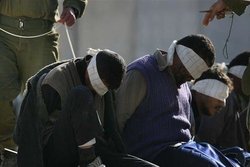 Hundreds of Palestinians held in Israeli jails, detention facilities, and interrogation centres are preparing to launch a mass hunger strike once Israel implements new measures that will worsen conditions for prisoners.
Hundreds of Palestinians held in Israeli jails, detention facilities, and interrogation centres are preparing to launch a mass hunger strike once Israel implements new measures that will worsen conditions for prisoners. RNA - In a joint statement, prisoners, including administrative detainees who are held without charge, said their decision was in response to a "new level of oppression", according to Al-Jazeera.
"These measures are a declaration of war that marks a new phase of our struggle," the statement read.
They also called on Palestinian factions and activists to stand in solidarity with them and demanded nationwide rallies.
Israel holds 5,500 Palestinian prisoners, including nearly 500 administrative detainees, according to the Jerusalem-based Palestinian Prisoners' Rights Group, Addameer.
The call to action is in response to Israel's plans to worsen what are already poor conditions for Palestinians held in its jails. Public Security Minister Gilad Erdan announced the measures last week and the Israeli government is expected to enforce the measures in the coming weeks.
One of the more "serious" changes pending approval by the Israeli cabinet, is ending the policy of separating Hamas prisoners from those affiliated with rival Palestinian faction Fatah, according to Amjad al-Najjar, Spokesperson for Hebron-based Palestinian Prisoners Club.
Other measures include rationing water supplies, blocking funds to the Palestinian Authority, reducing the number of family visits, and preventing access to jail canteens.
For the past 12 years, detainees have mostly lived off food they pay for from the prison canteen.
There, they would buy things like chicken, meat, and canned goods as an alternative to prison meals that are not enough to "sustain detainees throughout the day", al-Najjar explained, noting that "if they (Israeli Prison Service) take that away, the alternative is simply not an option".
Israel has for years held Palestinians in overcrowded prisons with poor hygiene standards which each prisoner confined to a 2.9sq-metre cell, according to Addameer.
Some of the most severe policies Palestinians are subject to include the use of isolation for punishment and medical negligence.
Every year, dozens of Palestinian prisoners are held in isolation under the pretext of "security", Lana Ramadan, Addameer's international advocacy officer, told Al-Jazeera.
"The length of time in isolation that prison officials can order extends from 12 hours … to longer periods of six months to one year," Ramadan stated.
Another major issue is medical negligence, where doctors employed by the IPS have minimal medical qualifications and are not under the authority of the Israeli Ministry of Health.
Ramadan noted that medical issues among Palestinian prisoners are widespread and range in severity from chest infections and diarrhoea to heart problems and kidney failure.
"Although all prisons include a medical clinic, physicians are on duty irregularly and specialised medical healthcare is generally unavailable," she stressed, adding that most prisoners are usually prescribed painkillers instead of being given treatment for their condition.
In the past, such conditions have forced prisoners to start open-ended hunger strikes in order to secure basic rights. At times, prison authorities would resort to force-feeding, a practice that sometimes led to the death of Palestinians.
This is not the first time Israel has tried to limit the rights of detained Palestinians, most of whom are held in jails inside Israel, in contravention of Article 76 of the Fourth Geneva Convention, which requires that an occupying power hold prisoners from an occupied land within that area.
Palestinian leaders condemn existing conditions and say the new measures are another escalation of human rights violations. Rights groups say a lot of the proposed measures are de facto in place already.
According to Nadia Hijab, director of the Palestinian policy network, Al Shabaka, the measures are a political tool for Israeli politicians who are looking to garner support in the run-up to elections.
"As [Israeli Prime Minister] Benjamin Netanyahu's Likud party heads into the election, they are no doubt seeking to show they are even tougher on Palestinians," Hijab told Al-Jazeera.
Netanyahu's government announced elections for April 9, after the ruling coalition came up short of the votes needed to pass a contentious piece of court-ordered legislation. He is also facing mounting pressure over a series of corruption investigations into his affairs.
Hijab believes that the government's aim is to drive prisoners into another hunger strike in an attempt to detract attention from Netanyahu's problems.
"They worsen conditions in order to win over the Israeli right with the hopes of securing votes," he said, adding that "they want to win elections off of the suffering of Palestinian prisoners".
847/940